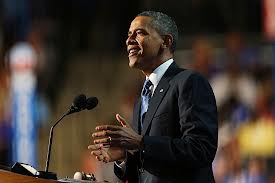I am more politically incorrect than your average guy, so when I heard President Obama call for universal pre-K for 4-year olds in the State of the Union, I cringed. With all the raucous enthusiasm ringing around this issue since the speech, adapting Warren Buffet’s investment approach to public policy might be wise: when everyone is bold, it’s time to be cautious.
In 2006, when I was with California Parents for Educational Choice, we were part of a coalition of organizations that defeated Rob Reiner’s ballot initiative to bring universal pre-K to the state. It was introduced to widespread public approval, but by Election Day garnered only 39 percent of the vote. The electorate came to understand three major elements they did not like:
* Expanding pre-K to everyone, including middle class and upper income families, is hugely expensive and precious little, if any evidence, supports much educational value added for the middle class and wealthy.
* The initiative vastly expanded the existing public school monopoly, which hardly has a resounding record of educational success, especially with poor and minority students. It also mandated collective bargaining, swelling the ranks and economic power of the California Teachers Association, an organization that systematically stands in the way of innovation and reform.
* The academic outcomes were questionable. A Reason Foundation analysis found from 1965 to 2005, 4-year old participation in preschool programs had grown nationwide from 16 percent to 66 percent, but we had virtually no evidence of increased student learning on the National Assessment of Educational Progress (NAEP) by fourth grade. Oklahoma, with a universal program since 1998, finished dead last on the 2005 NAEP, actually losing four points.
But that was close to seven years ago and admittedly, I haven’t followed the pre-K issue regularly. So I spent the last few days reviewing some studies and data. The key word in the Obama proposal is quality.
We likely can justify a highly targeted effort on kids in failed families or families that simply have no resources - financial, social, emotional, or cultural - to allow their children to mature and develop normally. But when Obama declares, “We know this works,” he overstates and simplifies our experience. (more…)
Florida state Sen. John Legg has a slogan ready for a bill he plans to file next week: “It’s not your daddy’s vo-tech.’’
The bill will focus on “high-end, high-skilled industry certifications at the high school level,’’ with one plank calling for some certifications to fulfill certain high school graduation requirements, said Legg, R-New Port Richey, who chairs the Senate Education Committee.
The certifications won’t replace any requirements, but serve as substitutions, he said. The idea is to put students on the fast-track for high-tech jobs that help grow the economy.
“Career education has changed since 1982,’’ Legg said. “It’s evolved. We’re trying to get the jobs back that we had in 2003, but we have failed. They’re not coming back, so we’ve got to train for jobs in 2023.’’
The bill, which is still being drafted, is part of a “very large package concerning career and technical education that will become a high priority for the senate,’’ he said.
It complements another bill Legg filed last month that would create “STEM zones” in counties with state universities that have high levels of research activity. Legg is looking primarily at the University of South Florida in Tampa.
Senate Bill 192 calls for partnerships between the Department of Education and Workforce Florida to build a gateway to science, technology, and engineering or mathematics careers.
The zones would create education hubs, not only looking to higher education facilities to train adults, but inviting traditional K-12 schools - as well as charters and private schools - to develop innovative curriculum for students and a pipeline of highly-skilled workers. In return, the schools would receive incentives, such as tax credits, expedited permits or grants, Legg said. (more…)
 President Obama has often called on us to be true to who we are as a people, as Americans. And in his second term, he has the opportunity to transform the education system back to our core - to where parents are primarily in charge of children’s educations.
President Obama has often called on us to be true to who we are as a people, as Americans. And in his second term, he has the opportunity to transform the education system back to our core - to where parents are primarily in charge of children’s educations.
We have paid a price for transferring authority and responsibility for educating children from parents to government entities. With mostly though not always good motives (remember Brown v. Board of Education), we allowed the dream of the government-owned and operated common school to live on despite overwhelming evidence that, in reality, it wasn’t working. A child’s educational destiny continues mostly to be a function of his/her zip code and the competence of strangers who sit on local school boards.
For more than three decades, a long, slow correction of this anomaly in American society has been underway. First, intradistrict and interdistrict transfers began to appear that allowed limited parental choice within some parts of the public school system. Then magnet schools surfaced, offering options such as vocational, talented and gifted, and language immersion programs, and responding to more demands. In 1992, charter schools emerged. Today they account for almost 6 percent of all public schools, approaching 6000 total, and the number grows steadily each year because the demand from parents so far is insatiable.
Thanks to my colleague at the American Center for School Choice, Gloria Romero, a new tool has appeared. The parent trigger empowers parents to make changes to their school when they are not satisfied. Already 20 states have considered the approach and seven have adopted laws.
Private school choice programs continue to gain support, too. And they have done so despite fierce opposition from forces that want to defend market share over a parent’s right to choose. Today, 32 such programs operate in the country. And in recent years, many school choice bills have either been passed by legislatures with Democratic majorities or signed by Democratic governors. Just as important, once enacted, these programs have only grown. No state has repealed a program or decided choice does not serve the public well. Moreover, the doomsday scenarios that opponents consistently forecast for public education systems have never happened.
It’s said you can’t argue with a river; it is going to flow. Parents are going to take back the authority and responsibility for educating their children. The river has been flowing for more than 20 years and the current is gaining speed. It’s time for more Democrats to stop arguing as families assert their fundamental and universally accepted American value that they know the best choice for their children. Democrats need to work in positive ways to transform our system. We need good schools and there’s plenty of room for all types - public, charter, and private.
President Obama has the life experience, as well as the political skills and credentials, to lead this transformation, and to make it less jarring and less confrontational. (more…)
Florida reforms make an impression. They’re a model for other states and influenced the Obama administration, writes The Guardian.
Still working. A teacher who lost his job in the Pasco school district after sending inappropriate text messages to a female student lands in the Hillsborough district, where he has been put on leave for undisclosed reasons, the Tampa Bay Times reports.
More outrage over Orange County charter school. Tampa Bay Times columnist John Romano links the $500,000 payment to a failing charter schools’ principal to other issues with charters and suggests state leaders are hypocrites and fools for not offering more oversight. Charter school supporters are also upset by what happened, redefinED reports.
Revisit new teacher evals. Editorializes the Tampa Bay Times.
Rick Scott’s ed plan has merit. Editorializes the Daytona Beach New Journal.
School choice politics. Surfaces over a school board election flyer in Duval County (Florida Times Union), in a key state senate race in South Florida (South Florida Sun-Sentinel), in this piece about campaign spending by education interest groups (Orlando Sentinel).
School board splits on public school choice in Lee County. From Fox 4.
Florida’s teachers unions among the weakest. According to a new report from the Fordham Institute.
Rick Scott’s education plans. The Orlando Sentinel leads with Scott’s proposal to issue state-funded debit cards to teachers so they no longer reach into their own pockets to pay for school supplies. More from WINK News, Fort Myers News Press, Palm Beach Post. The Florida Democratic Party had a negative reaction, but Scott’s plan generated mostly positive comments, including from the Florida PTA, Sen. Bill Montford of the Florida superintendents association and Wayne Blanton, executive director of the Florida School Boards Association. According to the Associated Press, Blanton “endorsed (Scott’s) recommendation to lift a cap on charter schools with a caveat — as long decisions to create new charters are left to local school officials. ‘An open-ended lifting of the cap may be more than we need,’ Blanton said, adding that districts are having a hard time keeping up with the growth of charters.”
More charter school payout. The principal of NorthStar High School, the charter school whose board paid her more than $500,000 as the failing school was shutting down, consumed the lion’s share of the 180-student school’s funding last year, the Orlando Sentinel reports. "I have never seen an act that egregious in 15 years of working with charters," said State Rep. John Legg, R-Port Richey, a charter school business administrator.
Teachers union bus tour. The AFT bus tour in support of President Obama is rolling through Florida. According to a press release, it's hitting Tampa, Daytona Beach, Ormond Beach, Orlando, Miami, Fort Lauderdale and West Palm Beach. AFT President Randi Weingarten is aboard. More from the Hechinger Report.
 DNC: President Obama suggests Mitt Romney would gut education spending, but avoids mention of Race to the Top (redefinEd). (Image from Minnesota.publicradio.org) Panel discussions sponsored by Democrats for Education Reform highlight the battle within the party over education policy (redefinED). Teachers union leaders promise to campaign hard for Obama, despite difference over teacher evaluations, charter schools and other policies. (Education Week)
DNC: President Obama suggests Mitt Romney would gut education spending, but avoids mention of Race to the Top (redefinEd). (Image from Minnesota.publicradio.org) Panel discussions sponsored by Democrats for Education Reform highlight the battle within the party over education policy (redefinED). Teachers union leaders promise to campaign hard for Obama, despite difference over teacher evaluations, charter schools and other policies. (Education Week)
Florida: The new chair of the state Board of Education helped bring the KIPP charter school network to Florida (redefinED).
North Carolina: The state board of education authorizes the opening of 25 more charter schools next year. (Associated Press)
California: The Los Angeles school district, which has more charter schools than any district in the country, is scheduled to discuss a moratorium on new ones. (Los Angeles Times)
Indiana: Republican gubernatorial candidate Mike Pence unveils an education agenda that includes expanding vouchers, but it's light on details. (Associated Press)
Pennsylvania: Cyber charter school are growing rapidly in the state, creating tensions with traditional school districts. (Pittsburgh Post-Gazette)
Tennessee: The state education commissioner blasts a privately-owned online school for its test results, calling them "demonstrably poor." (TheLeafChronicle.com)
New Mexico: The state's first virtual charter school begins classes. (Santa Fe New Mexican)
 Here are education-related excerpts from President Obama's speech tonight, according to prepared remarks:
Here are education-related excerpts from President Obama's speech tonight, according to prepared remarks:
Now, I've cut taxes for those who need it - middle-class families and small businesses. But I don't believe that another round of tax breaks for millionaires will bring good jobs to our shores, or pay down our deficit. I don't believe that firing teachers or kicking students off financial aid will grow the economy, or help us compete with the scientists and engineers coming out of China. After all that we've been through, I don't believe that rolling back regulations on Wall Street will help the small businesswoman expand, or the laid-off construction worker keep his home.
***
You can choose a future where more Americans have the chance to gain the skills they need to compete, no matter how old they are or how much money they have. Education was the gateway to opportunity for me. It was the gateway for Michelle. And now more than ever, it is the gateway to a middle-class life. For the first time in a generation, nearly every state has answered our call to raise their standards for teaching and learning. Some of the worst schools in the country have made real gains in math and reading. Millions of students are paying less for college today because we finally took on a system that wasted billions of taxpayer dollars on banks and lenders.
And now you have a choice - we can gut education, or we can decide that in the United States of America, no child should have her dreams deferred because of a crowded classroom or a crumbling school. No family should have to set aside a college acceptance letter because they don't have the money.
No company should have to look for workers in China because they couldn't find any with the right skills here at home. Government has a role in this. But teachers must inspire; principals must lead; parents must instill a thirst for learning, and students, you've got to do the work. And together, I promise you - we can out-educate and out-compete any country on Earth. Help me recruit 100,000 math and science teachers in the next ten years, and improve early childhood education. Help give two million workers the chance to learn skills at their community college that will lead directly to a job. Help us work with colleges and universities to cut in half the growth of tuition costs over the next ten years. We can meet that goal together. You can choose that future for America. (more…)
 From U.S. Education Secretary Arne Duncan's prepared remarks at the DNC tonight:
From U.S. Education Secretary Arne Duncan's prepared remarks at the DNC tonight:
I'm here tonight as a parent with two young children who attend a wonderful public school. No one has more at stake in this election than our kids, and that is why we need to re-elect President Obama!
Our president knows education is about jobs. It's about giving every child a shot at a secure middle-class life. Right now, we're in a race for jobs and industries of the future. If countries like China out-educate us today, they'll out-compete us tomorrow. The president believes that education begins at home with parents who take responsibility. But he also believes that teachers matter. In his first two years in office, he helped save the jobs of 400,000 educators.
And President Obama didn't just invest resources; he demanded reform. And 46 states responded by raising education standards. The president also believes teachers must be respected and paid like the professionals they are. No teacher should have to teach to the test. Great teachers should be recognized and rewarded.
And President Obama also knows that higher education is an economic necessity. He fought to keep student loan interest rates from going up. He fought for Pell grants. He took the big banks out of the federal student loan program and passed billions of dollars in savings on to young people. This year alone, he helped nearly 10 million students afford college.
The president knows that the path to the middle class goes right through America's classrooms. That was his path. That's America's path. However, his opponent believes differently.
Under the Romney-Ryan budget, education would be cut by as much as 20 percent. Think about what that would mean: 200,000 fewer children in Head Start, fewer teachers in the classroom, fewer resources for poor kids and students with disabilities, fewer after school programs. Ten million students could see their Pell grants reduced, putting higher education further out of reach. And these cuts wouldn't create jobs or pay down the deficit. They would go toward a huge new tax cut for those at the very top.
In order to cut taxes for millionaires and billionaires, Governor Romney will cut education for our children. That's the difference in this election. They see education as an expense. President Obama's sees it as an investment. That's the choice in this election. And that's why our president needs four more years!
Massachusetts Gov. Deval Patrick made the most extensive remarks about K-12 education on the DNC stage last night. He didn't explicitly mention Race to the Top, expansion of charter schools or a push for better teacher evaluation systems (all Obama administration priorities) but he did reference more accountability, higher teaching standards and longer school days. His suggestion of lower student achievement during Gov. Romney's tenure was wrong; Massachusetts is and has been an academic leader. In a nod to teachers unions, he described making ed reform in Massachusetts "with labor at the table." Here's the kicker to his speech, which highlighted change at a high-poverty school in Boston:
 What's at stake is real. The Orchard Gardens Elementary School in Boston was in trouble. Its record was poor, its spirit was broken, and its reputation was a wreck. No matter how bad things were in other urban schools in the city, people would say, "At least we're not Orchard Gardens." Today, thanks to a host of new tools, many enacted with the help of the Obama administration, Orchard Gardens is turning itself around. Teaching standards and accountabilities are higher. The school day is longer and filled with experiential learning, art, exercise and music.
What's at stake is real. The Orchard Gardens Elementary School in Boston was in trouble. Its record was poor, its spirit was broken, and its reputation was a wreck. No matter how bad things were in other urban schools in the city, people would say, "At least we're not Orchard Gardens." Today, thanks to a host of new tools, many enacted with the help of the Obama administration, Orchard Gardens is turning itself around. Teaching standards and accountabilities are higher. The school day is longer and filled with experiential learning, art, exercise and music.
The head of pediatric psychology from a local hospital comes to consult with faculty and parents on the toughest personal situations in students' home lives. Attendance is up, thanks to a mentoring initiative. In less than a year, Orchard Gardens went from one of the worst schools in the district to one of the best in the state. The whole school community is engaged and proud.
So am I. At the end of my visit a year and a half ago, the first grade—led by a veteran teacher—gathered to recite Dr. King's "I have a dream" speech. When I started to applaud, the teacher said, "not yet." Then she began to ask those six- and seven-year-olds questions: "What does 'creed' mean?" "What does 'nullification' mean?" "Where is Stone Mountain?" And as the hands shot up, I realized that she had taught the children not just to memorize that speech but to understand it. (more…)